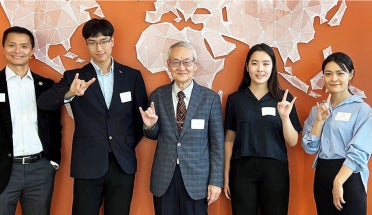
Diplomacy Lab Engages Students and Faculty in U.S. Foreign Policy Challenges
- Feb 28, 2020
- Global Initiatives
- by Jenan Taha
International relations and global studies students at UT are addressing real-world foreign policy issues through Diplomacy Lab, a U.S. State Department program that calls on academics around the country to produce innovative research on foreign affairs and contribute directly to the policymaking process.
The program, which offers a growing list of research topics each semester, allows students to receive class credit while collaborating on reports and presentations for the State Department. This is the first year Diplomacy Lab has been offered at UT, and Professor Michael Mosser’s capstone classroom was the first to participate this past fall.
“Diplomacy Lab is far more than just your typical term paper that you write at the end of the semester,” Mosser said. “It is potential for students to make real-world change. This project is a literal embodiment of ‘what starts here changes the world.’”
The program was launched in 2013 by Secretary of State John Kerry, and has since course-sourced projects to dozens of universities around the country. To participate in Diplomacy Lab, faculty members submit bids to the state department for projects in their areas of expertise, and the State Department will accept the best bids for each project. The State Department accepted five out of the six project bids Mosser applied for in 2019.
His students conducted research on topics including healthcare in the Western Hemisphere, South Korea’s role in the Indo-Pacific, Chinese influence operations in Australia, and gulf-based extremist ideology. Teams can range in size from one to several students, and are led by a university faculty member and a State Department official.
Dr. Olga Cabello Henry, the State Department health advisor in the Bureau of Western Hemisphere Affairs, led the student team researching healthcare. This was her first time collaborating with Diplomacy Lab students. She says the team’s work will inform policymaking on health issues in Latin America.
“The State Department encounters significant problems and issues relating to health in the region that we don’t have the bandwidth to research,” Cabello Henry said. “We truly appreciate the helpful work that these students contributed to our engagement on health issues in the region.”
Elena Solimano, international relations and global studies senior, was one of six students researching healthcare in the western hemisphere, focusing on health systems in Brazil. A speaker of Spanish and Portuguese, she was able to use her language skills in her research, and says the partnership with the State Department was a unique opportunity to do impactful research on a topic that matched her interests.
“I think Diplomacy Lab expands students’ realization of what their work can do,” Solimano said. “A lot of times in college we’re writing a paper and thinking ‘this doesn’t matter.’ Diplomacy lab encapsulates everything that we’ve been working on and uses it in an external matter. I think it helps students realize that everything they’ve learned matters.”
Mosser said his goal is to see Diplomacy Lab opportunities expand across campus to create a more collaborative and interdisciplinary program spanning several colleges and schools.
All academic fields and majors at both the undergraduate and graduate level are eligible for Diplomacy Lab. The 2020 project menu will be available in March, kicking off the faculty bidding process which ends in early April. Learn more about Diplomacy Lab opportunities and sign up to receive bidding materials on the Texas Global website.



